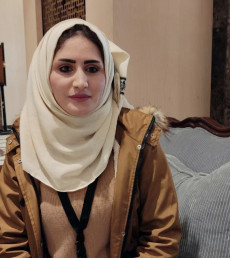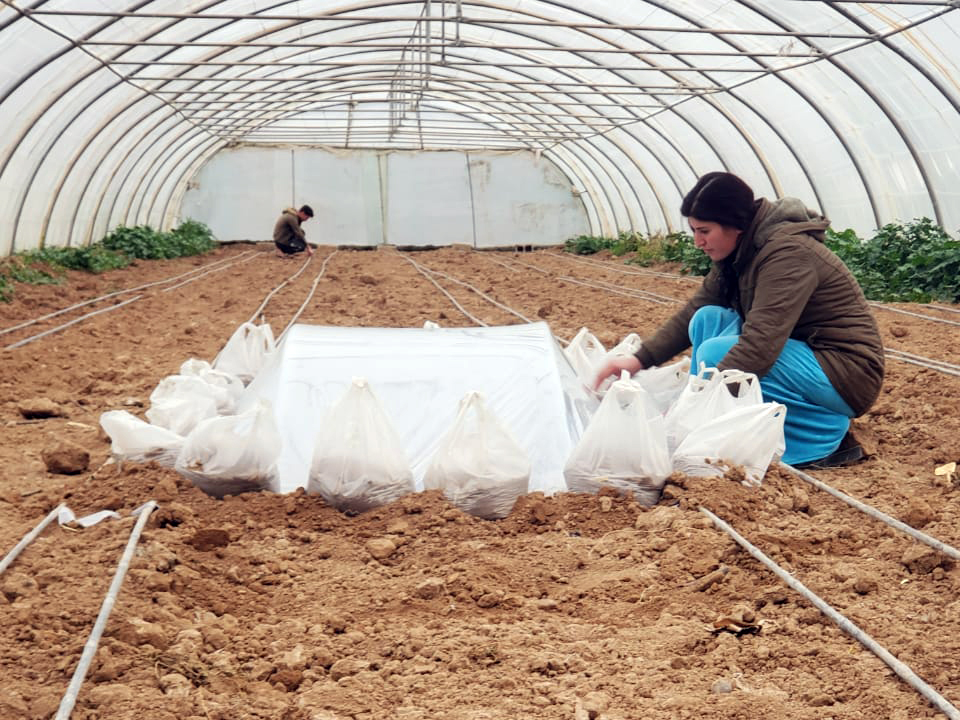
I would have liked to complete my education and become an officer in the army
By Farman Sadiq

I would have liked to complete my education and become an officer in the army
By Farman Sadiq
Marwa Kakai talks with great enthusiasm about her project. She has never thought of failure and believes that success is guaranteed because she is not alone but supported by 34 women farmers.
Marwa's project represented by farming in greenhouses, a new experiment supervised by a group of women and girls in the village of Al-Majidiya in Nineveh Plain.
“This was a dream come true. I have always wanted to lead a group like this to help the women of my village. Our group now includes 34 women and girls who are farmers, all working as a team,” says Marwa, 24-years-old, about her project.
The women and girls of the group are from the same village, some of them are younger than Marwa and others reach 35 years old, all of them work in agriculture and have experience in that field.
"Our work is on the right track, the greenhouses have been installed, we have received the necessary supplies for the project and it's time to start," Marwa told KirkukNow. "The success of our project is being tested, and the continuation and expansion of the project depends on us, so our task is difficult at this stage. "
The greenhouse project coincided with Marwa's founding of the women farmers' team, when the People's Aid Organization PAO, a non-governmental organization, visited the villages of the Nineveh Plains two years ago, and after hearing the idea they decided to provide support and assistance.
Marwa says that PAO has held training courses for farmers in the area, and after the idea of the project was presented, it took its first step which was the formation of the Association of Women Farmers and then the implementation of the project.
Al-Majidiya village is located in Al-Hamdaniyah District, southeast of Mosul. The population of the village is more than 1,200 people, all of whom are Kakais. Their main work is agriculture. The village is famous for the production of potatoes, cucumbers, okra tomatoes and grain crops.
This was a dream come true
Kaka'i, or Yarsanism, is a monotheist spiritual religion that has no special places for worship, a religion mostly practiced in Iraq and Iran. Kaka'i followers are about 100,000, mostly found in northern provinces of Sulaymaniyah, Kirkuk, Erbil, Nineveh, up to Diyala in the middle of Iraq.
Marwa pointed out that "the openness of the villagers was the reason behind the establishment of the Women Farmers' Association and the support that the organization provided to the project."
The Kakais of the Nineveh Plain are still trying to revive the agricultural sector due to the great damage and losses inflicted on their villages after the attacks of the Islamic State in Iraq and Levant ISIL in June 2014 and the military operations.
The Kakais, like other minorities, have been subjected to persecution and violations as statistics obtained by KirkukNow from the mayor of al-Hamdaniya indicate that 10% of the district's population are still displaced.

Nineveh, February 2022: A woman and her husband in the village of Al-Majidiya work together in a greenhouse. KirkukNow
During ISIL attacks, Marwa’s family was displaced to Erbil but they stayed there for a short time and returned to the village of Zangil in Hamdaniya district, the only Kakai village that was not reached by ISIL militants, located only seven kilometers from the village of Al-Majidiya.
Marwa’s family settled there until the area was completely restored in July 2017, then they returned to the village of Al-Majidiya.
“We resumed farming, working in the fields is not unusual for women and girls of the village, as they often work side by side with the men, as all my family members worked together in the field,” said Marwa.
PAO promotes agriculture and the elimination of the effects of war in the Kaka'i villages by granting small loans, providing supplies and equipment to farmers, and opening courses on new farming techniques in order to encourage the residents to stay in their areas.
“Before opening that course, we were also practicing agriculture, so it did not present any difficulty for us, but they showed us in detail how to grow inside greenhouses.” Marwa believes that the training courses helped them get to know other people, gain more experience, and communicate with agriculture officials in Mosul, Al-Hamdaniya. and other regions.
So far, Marwa has participated in six training courses, all of which were specific to greenhouses, and after each course she returns to her village to inform her women's team about the details.
Marwa is the youngest daughter of her family. She has two older sisters and five brothers. Marwa recently married, but she has not yet become a mother, so she devotes most of her time to farming.
"I had to quit school in class eight because I had to go to another village to complete the secondary school. Walking seven kilometers every day to get to school was very difficult and exhausting. The boys were able to board vehicles passing by but it was difficult for the girls whom don't dare get into a vehicle with strangers."
"I would have liked to complete my education and become an officer in the army," says Marwa. "I would like to be an officer."
After dropping out of school, Marwa became and still is a farmer, like other residents of Al-Majidiya village. She wakes up at four o’clock in the morning and starts work during the planting season, especially watering okra. A small part of the village’s residents is involved in raising livestock, they only benefit from it to secure the village’s daily needs of dairy products.
"This month (February 2022), we will start the greenhouse project by planting cucumbers and potatoes."
PAO distributed 20 greenhouses to the women of Al-Majidiya village, where all three women work in a greenhouse. The length of each greenhouse is 55 meters and its width is 12 meters, and the area of each house is 660 square meters. The greenhouses were built on a land area of more than five acres.
Marwa says that several other organizations provide aid to the people in Majidiyah and other villages in the Nineveh Plain in various fields.
In the Nineveh Plain, Kakais are abundantly present in Qaraqosh, the center of Hamdaniya district and the villages of Majidiyah, Zanagl, Tola Band, Wardak, Kazkan and Kabarli.
Marwa's women's team plans to expand, after the success of their first project, they will seek to include other women and girls and provide them with greenhouses. Marwa says that the number of female farmers in the village exceeds 150 women and girls, and they aspire to transfer this experience to other villages.
"My goal is to serve people and make the project a success, after which I will think about achieving my other dreams and completing my studies," says Marwa Kakai.